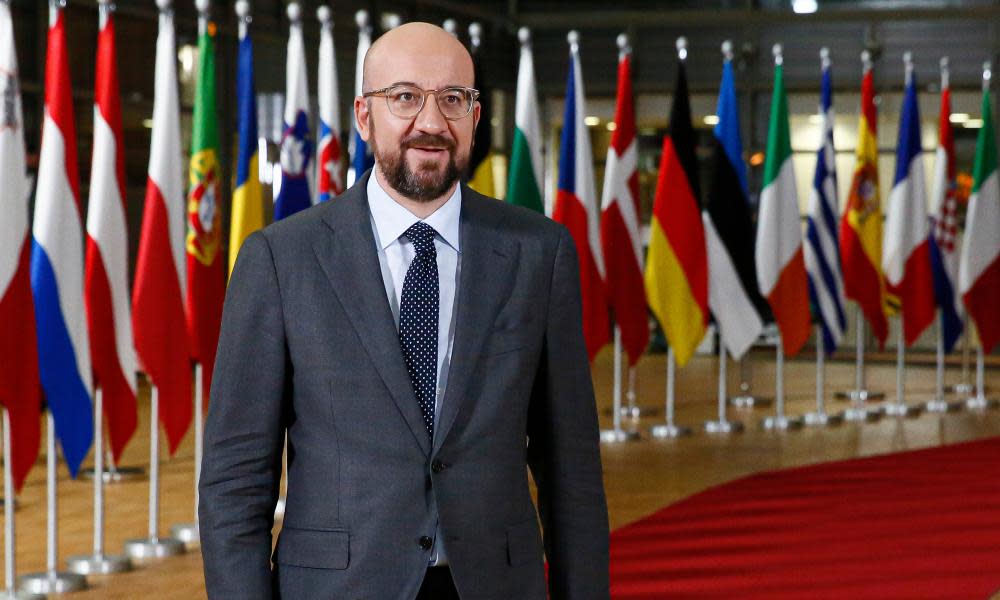The Guardian view on Europe after Brexit: unity is strength

These are strange and somewhat disorientating times for the European Union. A multipolar world in which China’s influence grows, and Donald Trump’s United States is at best an erratic ally, has created new dilemmas and dangers. Closer to home, Brexit, whatever eventual form it takes, is already transforming the political landscape. For the 27 remaining EU member states, life without Britain truly begins this week. And the first problem to be solved is money.
At a special summit on Thursday, called by the new European council president Charles Michel, discussions will begin in earnest over the shape of the EU budget from 2021 to 2027. They will be conducted in the absence of one of the biggest contributors to the collective pot. Taking place every seven years, these negotiations are fraught at the best of times; this round is likely to be the most difficult in the EU’s history. Its progress will provide a litmus test of the union’s ability to fashion a successful, confident strategy in challenging circumstances.
The loss of the UK’s annual contributions has left Brussels with a financial shortfall of around £62bn. In stark terms, that means that each country will have to pay more into the pot in future. The questions of how much more, and on what, have already become the source of divisions which could deepen existing antagonisms between east and west and north and south. A so-called “frugal” faction, represented by prosperous countries such as the Netherlands, Denmark and Sweden, is calling for the budget to be capped at 1% of EU gross national income, with a new spending emphasis on areas such as tech innovation and migration. The richer countries are also resisting calls by Mr Michel to phase out rebates to the largest net contributors to the budget. Poorer member states are demanding more money and more focus on traditional goals such as regional development and agricultural subsidies. Crucially, the rise of nationalist politics is informing both sides of the argument: Hungary’s prime minister, Viktor Orbán, for example, presents regional redistribution of European funds to the east as just compensation for multinational profits routinely funnelled back to the west; in the more well-heeled corners of Europe, the popularity of far-right parties such as the Sweden Democrats and the FvD in the Netherlands fuels the calls for slimmed-down payments to the union’s poorer relations. In one position paper, the “frugals” warn that “placing an ever-increasing financial burden on a small number of member states will not be acceptable to our citizens”.
In normal times, Germany could be expected to act as an anchor of stability amid such turbulent waters. But Angela Merkel’s government also finds itself looking over its shoulder at nationalists. Last week Mrs Merkel’s successor as chair of the CDU, Annegret Kramp-Karrenbauer, stepped down, ushering in a period of unpredictable transition on the German right. Her resignation followed a decision by CDU politicians in the eastern state of Thuringia to break the taboo on forming alliances with the far-right Eurosceptic party Alternativ für Deutschland (AfD). Chancellor Merkel has already announced her intention not to stand for office again in elections due in 2021, although that contest might now come sooner. As it seeks to elect a new leader, the CDU thus faces its own period of soul-searching on whether it should tack to the nationalist right in order to see off the AfD threat.
The world needs a flourishing EU which can unite around common goals. Among the subjects up for discussion, for example, in this week’s summit, is the £100bn “green deal” designed to subsidise less wealthy member states on the path to net-zero carbon emissions by 2050. It would be lamentable if this initiative succumbed to a new politics of division. In the age of Trump and the rise of China, it also falls to Europe to make the case for economic cooperation and compromise and lead the way on issues such as human rights and digital privacy. For the EU, life without Britain begins in earnest tomorrow. And the stakes could not be higher.


